- Home
- Neal Stephenson
The Mongoliad: Book Two Page 2
The Mongoliad: Book Two Read online
Page 2
The Templar and Hospitaller commanders had argued with Calpurnius, the master of the Shield-Brethren company, as to the membership of the team that would lead the upper-floor assault. Calpurnius had listened calmly to both men’s arguments and then asked one question. “There will be no horses on this boat. How will your knights fight?”
Edzard screamed at the men on the starboard side, threatening to throw them overboard if they didn’t match the pace of the port team.
The man crouching next to Raphael shivered and looked like he was about to vomit. His name was Eptor and he was a year younger than Raphael. A farmer’s son, his family lived less than a day’s travel from Petraathen, the stronghold of the Shield-Brethren. He, Raphael, and a dozen others in this company had all taken their oaths together. The Fifth Crusade was their first fielding as knights of the order.
In addition to the sword and shield carried by each of the Shield-Brethren, Eptor had a flail to which he had added several extra lengths of chain, as if to mirror the chains that spanned the river. It was a farmer’s weapon, more useful for threshing grain than killing infidels, and Raphael was more nervous about being struck by an errant chain than a Muslim sword. Eptor clung to it, though, like a child hanging onto a protective totem.
The boat swung back to port, and the stone wall of the tower hove into view once more. The barge shuddered as the Nile lifted the heavy boat and hurled it directly at the tower.
Calpurnius had blessed each one of the Shield-Brethren, loudly proclaiming that God would protect each of them from the arrows and stones of the Muslim infidels. As he had clasped each man to his chest, he had whispered a private evocation of the Virgin in their ears. She will be waiting for you, he had said. As she does all of those who take up arms in her name.
The boat quivered beneath them like a horse about to expire. Overhead, something struck the hide roof, and the water-soaked leather hissed and steamed. A roaring noise like the howl of angry demons made the men flinch, and long black fingers of ash began to smear through the protective cover.
Eptor started to moan, his face slick with sweat.
Raphael shook his head, trying to catch the other man’s gaze. Eptor, caught up in the shame of his terror, refused to look at Raphael.
Raphael grabbed the chain of the other man’s maille and hauled him close. They were going to cross the bridge together. He needed Eptor to not panic. As the hide roof began to smoke and crumble to fiery ash, he put his mouth close to Eptor’s ear and began to shout the Virgin’s Prayer.
The deck lurched beneath them as the boat collided with the rocky spur that supported the chain tower. Wood splintered far beneath them, and the tenor of the river changed as water began rushing into the shattered hull. “Attack!” Edzard screamed.
The ropes holding the bridge were cut. The narrow crossing fell, bouncing as its end collided with the rough ramparts of the tower. The men surged forward, eager to cross the exposed bridge.
There was no more time for prayer.
Take up your arms, my brothers, and fight.
She will be waiting for us.
Verna, 1224
Raphael’s admission of being in Egypt did little to diminish the lay brothers’ enthusiasm. Welcoming the young man as an honored guest, they practically dragged him to the oratory, where he couldn’t escape their queries. Initially reticent to talk of his experiences in Egypt, Raphael finally relented after some earnest coaxing from Piro and the younger men. At first he spoke hesitantly, clearly having trouble settling on a story, but after a few minutes of haphazard storytelling, he fell into an oft-told tale. He spoke plainly and easily, with a natural oratorical grace that reminded Brother Leo of a young Brother Francis.
Brother Leo had at first assumed Raphael to be nothing more than an itinerant student, a minor son of a wealthy Ghibelline family from Arezzo who had joined one of the military orders. After listening to Raphael speak, Brother Leo was struck by the similarity between who this boy had become and who Brother Francis might have been. Francis, eager to wear the mantle of chivalrous knighthood, had taken up arms along with many other sons of Assisi against Perugia. When the battle had been lost at Collestrada, Francis had been captured and held for ransom—a captivity that was to last a year. If God had not chosen Francis, would he have become like this man? Brother Leo wondered.
“This fire you speak of,” Brother Cotsa asked. “Greek fire. What is it?”
“It is an alchemical mystery,” Raphael explained. “It is water that burns. It was the Byzantines, I believe, who mastered it first. They used it against the Persian Empire, and since then their alchemists have been attempting to create their own version. Naft, they call it. They put the liquid in a flask and wrap the flask in leather and cloth, which they set alight. The mangonel hurls these flaming flasks with enough force that they shatter upon impact, spreading a large wave of burning liquid.” He held up his hands as if he were cradling a skull. “Something not much larger than this—” He spread his arms, indicating the sparse space of the oratory, “—and...” He faltered, suddenly at a loss for words. Realizing what he was implying with his gesture.
This entire room, Brother Leo realized, filled with fire. “Let us speak no more of these atrocities of war,” he interjected quickly. He fumbled for the wooden cross attached to the loose strands of cord around his neck.
He said this more for the benefit of the others, but it was clear that his words broke through whatever spell had come over the young man in the telling of his tale. “I am sorry,” Raphael stuttered suddenly. “I...That is not why I came here.” His eyes widened as he seemed to realize how small the oratory was, how hemmed in he was by the others. The frightened face of a trapped animal.
Brother Leo shoved his way through the crowd and inserted himself between Raphael and the lay brothers. “Enough,” he said. “We have been neglectful in our hospitality. Did our guests not bring victuals? We should investigate as to the possibility of a bottle of wine. And some cheeses perhaps. Those would be a proper cause for celebration, especially in this house of God.” He glared at Cotsa and Mante, the two who had been most vocal in their desire to hear the young knight’s stories.
Brother Mante was already fleeing for the door, Piro at his heels, eager to retrieve the forgotten satchels. The other lay brothers nervously made the sign of the cross as they tried to make themselves less noticeable to Brother Leo’s baleful eye. He was not without fault, he knew. He too had been caught up by the young knight’s tale.
He turned and sat down heavily next to Raphael on the rough-hewn bench that served as the room’s pulpit. “I have been a Fratricelli, a lesser brother, for many years,” he said, “and I have lived here since this oratory was first built. I should be more accustomed to the life I have chosen for myself—for the devotion I have given myself over to.” He smiled at the contrite man sitting next to him, a fatherly smile meant to reassure and comfort. “But, as God continues to remind me—to remind each of us—we remain fallible, easily led astray. We crave the company of others. We delight in stories of outrageous adventure.” He shook his head. “We forget the burden laid upon those who tell such stories.”
Raphael said nothing. His hands fumbled over each other, and more than once his right hand strayed toward the hilt of his sword.
What atrocities has this young man experienced? Brother Leo wondered. Brother Francis had railed many times about the lack of faith in those who sent young men to die in the Crusades. Are we not shepherds of a flock? Francis had preached more than once since returning from the Levant. And does this flock not seek guidance and humility and sanctuary from us? This young man had been trained for war, and he had survived a Crusade known for its brutality. What was left? Brother Leo wondered.
“During the Crusade, I saw many whose faith in God failed to sustain them. On both sides,” Raphael said, his voice soft enough that Brother Leo had to lean his shoulder against the other man’s in order to make out the words. “Do you know the Muslims believe in the same God as
Christians do? They have a different name for him—Allah.”
“I have heard Brother Francis speak of the Muslim beliefs,” Brother Leo replied, happy to be speaking of a different topic, even if it was one he was not well versed in. “I have not had the opportunity to study them myself,” he admitted.
“Do you know their traditional greeting?” Raphael put his hands together as he had when he had first arrived. “As-Salamu ‘Alaykum,” he said. “It means ‘Peace be upon you.’ That is not dissimilar to the greeting you offered me. I have heard Brother Francis use it as well.”
“He finds it suits his mission—our mission—quite well,” Brother Leo said, nodding.
“My father was a German soldier,” Raphael said. “He fought for Frederick Barbarossa and went with him to the Holy Land for the Crusade. When Frederick died in the river crossing, my father completed the pilgrimage to Jerusalem. He ended up fighting for King Richard of England against Saladin. However, when Richard returned to England, my father stayed in Acre. My mother told me he became a Knight of the Teutonic Order, but—” Raphael shrugged, “—when I got old enough to ask of him, the master of the order claimed to not know my father.”
Brother Leo nodded. He continued to fiddle with his cross, playing the well-rehearsed role of listener.
“I grew up among Muslims,” Raphael continued, winding his way toward the confession he sought to make. “I played in the shadow of Muslim minarets and mosques. Their call to prayer—the azan—was as much a part of my childhood as the shouts of the merchants in the market or any oratory from a pulpit—more so, in fact, for it happened multiple times each day. How could I become a Christian warrior and treat these people as my lifelong enemy?”
Brother Leo shrugged as if the question was mysteriously opaque to him as well.
“When I was old enough to think I knew something of the world, I stowed away on a Venetian merchant ship. The captain found my audacity not without charm, and instead of hurling me into the Mediterranean, he put me to work. I stayed with him for several years, all the while yearning to set foot in Christendom—the land where my father had come from. Finally, when the ship was in Trieste for repairs, I managed to escape. I went north, hoping to find the Teutonic Knights again. They had gone to Transylvania to fight against the hordes from the east—an enemy of which I had no knowledge. I could kill these infidels, I thought, because they were strange to me. During my journey, I fell in with a party traveling to Petraathen, the citadel of the Ordo Militum Vindicis Intactae. They took me in instead, and after years of training, I took their vows—pledging myself to serve the Order and the Virgin.”
Brother Mante returned, a bottle in either hand. “Ho,” he said. “A bounty has been provided.” Piro crowded behind him, carrying an armful of wooden cups.
As one of the bottles was opened and the cups were filled, Raphael sighed. “God is testing me, isn’t he?” he asked.
Brother Leo hesitated. God tests all of us, was the thought he had, but he feared such language would not assuage the young man’s despair. He wished Brother Francis were with them. He would have words that would soothe the knight; he could tell Raphael of his own trials as a knight of Assisi. He had been commanded to fight against his own people when Assisi went to war with Perugia.
But Brother Leo had not had such experience. Nor, he quickly admitted to himself, will I ever know what it is like to take up a sword against another man. Battle changed men; that was part of why Francis preached so strenuously for nonviolent resolutions to conflict. Fighting your fellow man was bestial behavior—worse than beasts, in fact, for no wolf or bear assaulted kin for the specious reasons many nobleman and king clung to as their rationale for going to war.
He accepted a cup from Piro and swallowed a mouthful of the warm liquid, wincing at the bitterness of the young wine. “God is inexplicable,” he said, moving his tongue around his mouth in a vain effort to clear the taste. “He gives us both anger and compassion in equal portions,” he continued, trying to recall one of Brother Francis’s sermons. “Which of those two we choose to live our lives by is how we demonstrate whether we are worthy of His grace.”
Raphael had accepted a cup from Piro as well, but he rested it on his thigh as if he were unaware of its presence. Brother Leo could not entirely blame him. A cup of wine was a rare luxury at the hermitage, but even his dull palate could tell this wine could have benefited from another season in its barrel.
Patience was a virtue, especially among vintners.
Brother Leo waited for Raphael to continue. The young man’s burden had been carried a long distance, and it would take him a little while to shrug it off his shoulders.
“I killed men in Egypt,” Raphael said, finally stirring himself to speak again. “Shortly after I took my vows, we were ordered to join the Crusade to take Egypt from the Sultan, Saphadin. I went with my brothers, eager to make the right choice. I had been instructed, over and over again until it was the only thing I seemed to know, that the Virg—that God—wanted me to defend Him. I must uphold God’s law, and to do so, I must defeat those who wish to subvert His law. And that is what I did. I killed men in the name of God. Men, who, in another time and place, might have been kind to me as a child. Why were they my enemy? Because they believed that Jesus Christ was just a man and not the Son of God? Does that make them any less deserving of my compassion?”
Brother Leo tried to think of a suitable response, but nothing came to mind.
“I arrive at your sanctuary, and even though you do not know me, you greet me with affection. ‘May the Lord give you peace,’ is what you said.” Raphael twisted his body so that he could look at Brother Leo. “And how do I return your blessing? Your lay brothers ply me with requests to tell them of my exploits, and I agree to their request.” His voice was agitated, rising from deep within his throat. “The Crusade was a failure, and yet I am looked upon as a hero for what I did. I speak of my actions not with shame and revulsion but with pride. How can my spirit be so...so broken? How can a man suffer to live with this desire to please God—to train and take up arms in His name—and yet still live a compassionate life?”
Damietta, 1219
Almost a year had passed since the Crusaders had taken the tower in the Nile, and still Damietta remained inviolate. The catapults on the walls hurled their deadly payloads less frequently, and most of what came tumbling out of the sky was loose rock—the stores of the alchemical fire had long been emptied. The defenders hurled rocks at the Christian war parties without much enthusiasm, as if their efforts were expected as part of the dialogue of war, but they had no heart for it any longer.
The Crusaders had little heart left for the siege either. Over the last six months, it had become apparent to John of Brienne and the few noblemen who stood with him that Damietta held little military value. As difficult as it was for the Christians to get in, it would be equally difficult for them to get out again, especially if the Sultan’s armies filled up the flood plain behind them.
Saphadin, the man who had been Sultan when the Crusade began, had died shortly after the tower assault. His son, Al-Kamil, who had been ruler of Egypt when the Crusade began, now held sway over the entirety of the Muslim domain. While his father remembered some of the atrocities of the previous Crusade and never relented in his desire to drive the Christians out of the Levant, his son appeared to have a different perspective. He had offered, more than once, terms of peace that seemed too good to be true.
The legate from Rome, Pelagius, believed this offer of peace was a lie, facile words offered by a heathen who could not be trusted. Rome wanted Damietta, he insisted, and Rome would have the city.
Of the original company of Shield-Brethren who had joined the Crusade at Acre, only eighteen remained. Of those, four could still carry arms—and would do so at a moment’s notice—but they would not ride to meet the enemy. The enemy would have to come to them.
Eptor, the farmer’s son who had charged across the narrow bridge with Raphael,
was one of those four. The wounds still plaguing him were not physical. His body had healed and his spirit remained resolute, but his mind was dimmed by the presence of a shadow. At first he had merely been prone to fevers, but as the winter passed, his bouts of night sweats gave way to more disturbing signs. Eptor began to speak of their dead brothers as if they were still alive.
Raphael, with whom the stricken farmer’s son had formed an unshakeable bond, was tasked with keeping his ailing comrade within the clutch of Shield-Brethren tents. While the Shield-Brethren did not abandon one of their own, regardless of his mental condition, there would be others in the Christian camp who would not be as tolerant of their brother’s disturbed speech. The last thing this morale-stricken camp needs is a rumor of witchcraft and demonic possession, Calpurnius had instructed Raphael. Keep him—and us—safe.
The task had been fairly simple at first, in that Eptor was more than happy to follow Raphael like a faithful dog. And then the priest—Francis of Assisi, the founder of the Ordo Fratrum Minorum—arrived, and his revolutionary exhortation for peace changed everything.
* * *
It was not uncommon to see John of Brienne walking through the Christian camp. Though he was King of Jerusalem, he had never sat in its throne. His marriage to Maria of Montferrat had been one of political expediency, and his dowry had been the privilege of leading the Christian Crusaders in their vain effort to retake the Holy Land. Sir John governed from the ranks: listening to complaints of the men-at-arms; attending to the needs of the landed nobility who made up the bulk of the Christian cavalry; sitting and discussing tactics with the noble lords from France, Frisia, and England; and strategizing the best use of the diminishing number of knights from the three military orders. The Crusaders all knew him by sight, and while he allowed them to show some deference, he insisted on no title other than the one warranted by his numerous feats of arms.

 Zodiac: The Eco-Thriller
Zodiac: The Eco-Thriller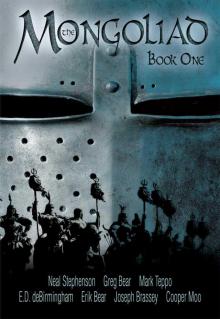 The Mongoliad: Book One
The Mongoliad: Book One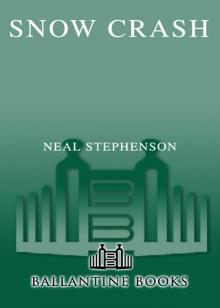 Snow Crash
Snow Crash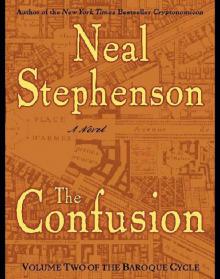 The Confusion: Volume Two of the Baroque Cycle
The Confusion: Volume Two of the Baroque Cycle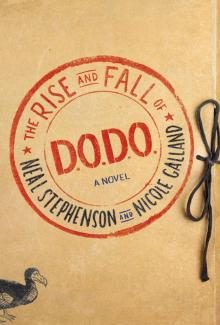 The Rise and Fall of D.O.D.O.
The Rise and Fall of D.O.D.O.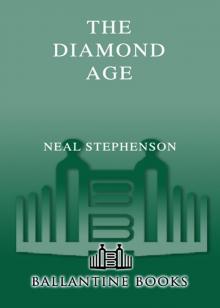 The Diamond Age: Or, a Young Lady's Illustrated Primer
The Diamond Age: Or, a Young Lady's Illustrated Primer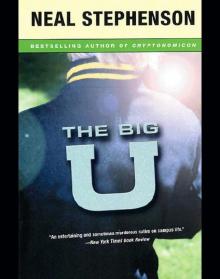 The Big U
The Big U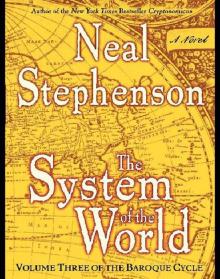 The System of the World: Volume Three of the Baroque Cycle
The System of the World: Volume Three of the Baroque Cycle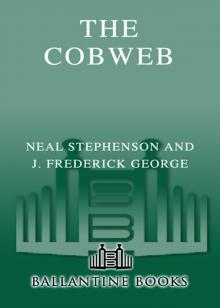 The Cobweb
The Cobweb Reamde
Reamde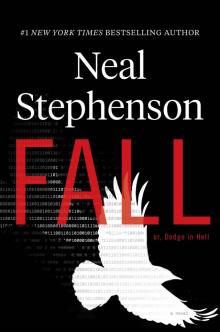 Fall; or, Dodge in Hell
Fall; or, Dodge in Hell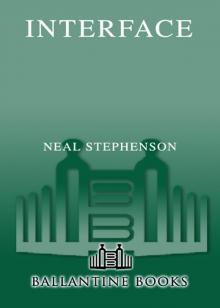 Interface
Interface Quicksilver
Quicksilver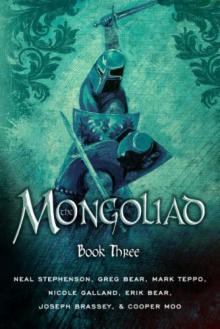 The Mongoliad: Book Three
The Mongoliad: Book Three Seveneves
Seveneves Atmosphæra Incognita
Atmosphæra Incognita In the Beginning...Was the Command Line
In the Beginning...Was the Command Line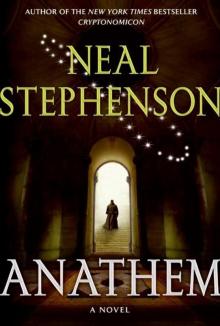 Anathem
Anathem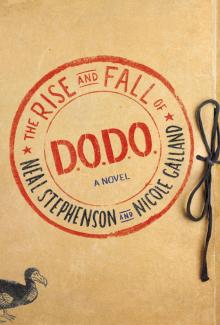 The Rise and Fall of D.O.D.O.: A Novel
The Rise and Fall of D.O.D.O.: A Novel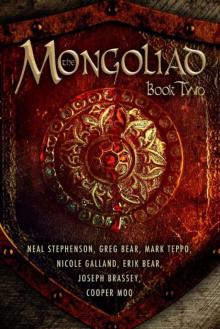 The Mongoliad: Book Two
The Mongoliad: Book Two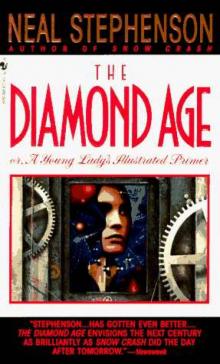 Diamond Age or a Young Lady's Illustrated Primer
Diamond Age or a Young Lady's Illustrated Primer THE System OF THE WORLD
THE System OF THE WORLD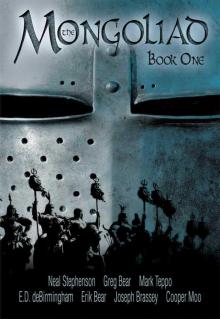 The Mongoliad: Book One tfs-1
The Mongoliad: Book One tfs-1 Some Remarks: Essays and Other Writing
Some Remarks: Essays and Other Writing Zodiac
Zodiac Spew
Spew The Baroque Cycle: Quicksilver, the Confusion, and the System of the World
The Baroque Cycle: Quicksilver, the Confusion, and the System of the World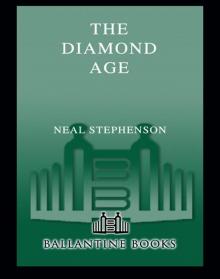 The Diamond Age
The Diamond Age Reamde: A Novel
Reamde: A Novel In the Kingdom of Mao Bell
In the Kingdom of Mao Bell Mother Earth Mother Board
Mother Earth Mother Board Twelve Tomorrows - Visionary stories of the near future inspired by today's technologies
Twelve Tomorrows - Visionary stories of the near future inspired by today's technologies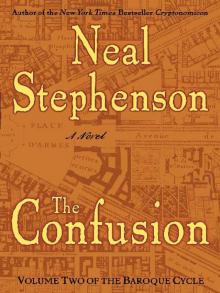 The Confusion
The Confusion The Great Simoleon Caper
The Great Simoleon Caper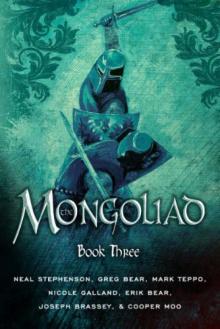 The Mongoliad: Book Three tfs-3
The Mongoliad: Book Three tfs-3